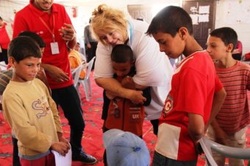prompt: Prompt: Can robots take care of babies in a nursery? How would this affect their development and how would it compare to human interaction?
My response: I believe that because how immenseley our technology has grown and been highly innovative, robots will be designed to perfectly take care of babies. Thus, I believe that robots will definiteley be able to "play" with babies, give them food, water/ milk, clothing. They will be able to put clothes on them and change their diapers. They will be able to clean up babies' messes. They will be able to talk and interact with them.
However, because robots, are machines and not humans, they are unable to feel. Thus, when a baby is crying, it is most likeley that the robot will not know why the baby is crying and how to console it in the best manner. Also, they will probably not have natural instincts, that a mom has to a baby or a caregiver has to a baby when it comes to genuineley understanding what the baby is feeling at certain times. Thus, this causes a huge communication impediment. Thus, robots will not be able to fully communicate with the baby to a full extent because it is restrained by not having any emotions. Also, although it may talk with the baby, the words coming out of its mouth will sound unnatural.
Thus, this will definiteley negativeley affect babies' interactions with other humans because they have been "raised" by this robot. They might speak in a way that doesn't express their emotions or they may speak monotoneley. They might not develop a lot of emotional intellegence because they have been raised by something that lacks emotional intellegence. Also, this may prevent the baby from being able to console other humans or feel their enjoyment because the baby wasn't able to feel anything from the robot.
I learned in my other class that there was this experiment done a long time ago where babies were secluded from the outside world for a while and when they came out of this seclusion, they weren't able to speak. Thus, because the baby would be secluded from the human interactions and world, it will hurt their ability to communicate.
-----Syeda Fareeda Inamdar
My response: I believe that because how immenseley our technology has grown and been highly innovative, robots will be designed to perfectly take care of babies. Thus, I believe that robots will definiteley be able to "play" with babies, give them food, water/ milk, clothing. They will be able to put clothes on them and change their diapers. They will be able to clean up babies' messes. They will be able to talk and interact with them.
However, because robots, are machines and not humans, they are unable to feel. Thus, when a baby is crying, it is most likeley that the robot will not know why the baby is crying and how to console it in the best manner. Also, they will probably not have natural instincts, that a mom has to a baby or a caregiver has to a baby when it comes to genuineley understanding what the baby is feeling at certain times. Thus, this causes a huge communication impediment. Thus, robots will not be able to fully communicate with the baby to a full extent because it is restrained by not having any emotions. Also, although it may talk with the baby, the words coming out of its mouth will sound unnatural.
Thus, this will definiteley negativeley affect babies' interactions with other humans because they have been "raised" by this robot. They might speak in a way that doesn't express their emotions or they may speak monotoneley. They might not develop a lot of emotional intellegence because they have been raised by something that lacks emotional intellegence. Also, this may prevent the baby from being able to console other humans or feel their enjoyment because the baby wasn't able to feel anything from the robot.
I learned in my other class that there was this experiment done a long time ago where babies were secluded from the outside world for a while and when they came out of this seclusion, they weren't able to speak. Thus, because the baby would be secluded from the human interactions and world, it will hurt their ability to communicate.
-----Syeda Fareeda Inamdar

 RSS Feed
RSS Feed